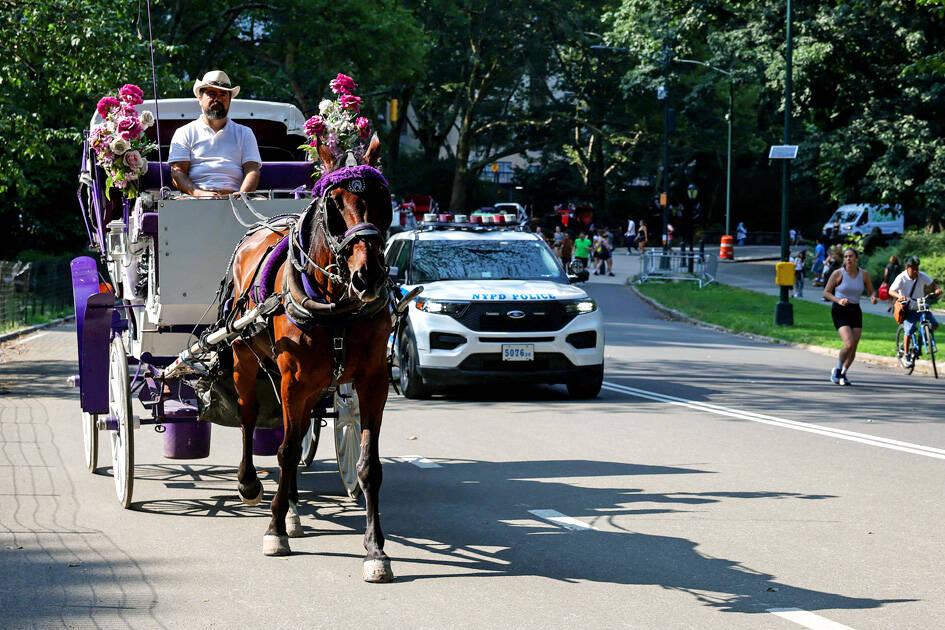The rights and wrongs of the horse-drawn carriages that carry tourists around New York’s Central Park have been loudly debated for years, but the mayor has signaled they might be at the end of the track.
Critics say the animals suffer, pointing to deadly collapses and dangerous escapes, while advocates point to the jobs they create and the heritage they uphold.
The rides, which cost US$150 for 45 minutes to several hundred dollars for a marriage proposal (no refunds), are popular with visitors to the Big Apple’s most famous natural attraction, which draws 42 million people annually.

Photo: REUTERS
However, native New Yorkers have been calling for the rides to banned “for so long,” according to animal rights campaign group People for the Ethical Treatment of Animals’ outreach director, Ashley Byrne.
The group leading the charge against tourist carriages, NYCLASS, was founded in 2008 and, in 2022, a survey found 71 percent of New York voters were against them.
New York Mayor Eric Adams recently weighed in on the emotive debate and called on the city council to rein in the practice, as he cannot do so himself.
He also signed an order allowing for the voluntary surrender of carriage licenses and supporting the re-employment of the 170 people involved in the carriage trade, while also hardening animal welfare and safety checks.
The summer season proved decisive in sounding the death knell for the Manhattan carriages, Byrne said.
“This has been a summer where the danger and cruelty of this industry has been on full public display. Between [carriage horse] Lady dropping dead in the streets, four different incidents — that we know of — of horses breaking loose, spooking and running wild,” she said.
The Central Park Conservancy, which manages the US’ most visited urban park, also threw its weight behind the calls for a ban.
“With visitation to the Park growing to record levels, we feel strongly that banning horse carriages has become a matter of public health and safety for Park visitors,” Conservancy chief executive Elizabeth W. Smith wrote to city leaders.
One way to phase out the carriages would be for the city council to adopt legislation first proposed in 2022 by New York City Councilor Robert Holden, who applauded the mayor’s intervention, but the union representing carriage drivers said that “developers have long sought to see the carriage-horse stables ... vacated so they can build skyscrapers” and that Adams “has betrayed working class New Yorkers.”
Carriage driver Christina Hansen added that “this is good work for horses,” which number about 200 and benefit from comprehensive veterinary care and “are highly regulated.”
Hansen said that the far greater threat to park users are the ubiquitous e-bikes and e-scooters.
As early as 2007, a democratic city councilor unsuccessfully sought a ban after failing to garner support from powerful then-New York mayor Michael Bloomberg.
His successor Bill de Blasio campaigned on a ban — but only managed regulation of the industry which bills itself as a custodian of New York’s cultural heritage.
However, Adams’s window to abolish the carriages is closing — New York goes to the polls on Nov. 4 and polling suggests the sitting mayor is unlikely to clear the final fence.

Taiwan’s exports soared 56 percent year-on-year to an all-time high of US$64.05 billion last month, propelled by surging global demand for artificial intelligence (AI), high-performance computing and cloud service infrastructure, the Ministry of Finance said yesterday. Department of Statistics Director-General Beatrice Tsai (蔡美娜) called the figure an unexpected upside surprise, citing a wave of technology orders from overseas customers alongside the usual year-end shopping season for technology products. Growth is likely to remain strong this month, she said, projecting a 40 percent to 45 percent expansion on an annual basis. The outperformance could prompt the Directorate-General of Budget, Accounting and

The demise of the coal industry left the US’ Appalachian region in tatters, with lost jobs, spoiled water and countless kilometers of abandoned underground mines. Now entrepreneurs are eyeing the rural region with ambitious visions to rebuild its economy by converting old mines into solar power systems and data centers that could help fuel the increasing power demands of the artificial intelligence (AI) boom. One such project is underway by a non-profit team calling itself Energy DELTA (Discovery, Education, Learning and Technology Accelerator) Lab, which is looking to develop energy sources on about 26,305 hectares of old coal land in

Netflix on Friday faced fierce criticism over its blockbuster deal to acquire Warner Bros Discovery. The streaming giant is already viewed as a pariah in some Hollywood circles, largely due to its reluctance to release content in theaters and its disruption of traditional industry practices. As Netflix emerged as the likely winning bidder for Warner Bros — the studio behind Casablanca, the Harry Potter movies and Friends — Hollywood’s elite launched an aggressive campaign against the acquisition. Titanic director James Cameron called the buyout a “disaster,” while a group of prominent producers are lobbying US Congress to oppose the deal,

Two Chinese chipmakers are attracting strong retail investor demand, buoyed by industry peer Moore Threads Technology Co’s (摩爾線程) stellar debut. The retail portion of MetaX Integrated Circuits (Shanghai) Co’s (上海沐曦) upcoming initial public offering (IPO) was 2,986 times oversubscribed on Friday, according to a filing. Meanwhile, Beijing Onmicro Electronics Co (北京昂瑞微), which makes radio frequency chips, was 2,899 times oversubscribed on Friday, its filing showed. The bids coincided with Moore Threads’ trading debut, which surged 425 percent on Friday after raising 8 billion yuan (US$1.13 billion) on bets that the company could emerge as a viable local competitor to Nvidia